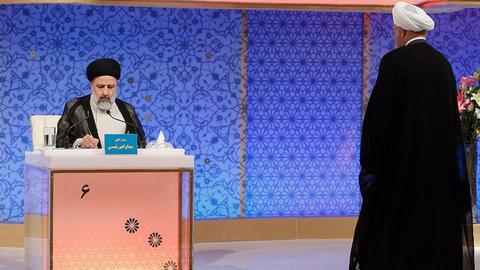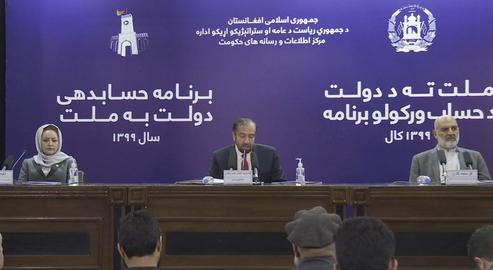Amid escalating political tensions in Iran, a poll published by the Islamic Republic News Agency reveals what political factions and government authorities in Iran know too well: the Iranian people do not trust the government or the country’s political system.
All sides of the entrenched political battle — whether officials from the administration of Hassan Rouhani or people from other political tribes — have repeatedly accused one another of undermining the public’s trust. The results of the survey only confirm this, sending a clear warning message to Rouhani and his administration just months before the country enters a fresh political battle: the presidential election.
What are the Polls' Findings?
Last month, a cleric accused President Rouhani of being an opium addict on state TV, prompting a counterattack from Rouhani’s government, along with a warning that such comments would deepen the crisis of mistrust in the Islamic Republic.
But it wasn’t just Rouhani’s allies that expressed concerns. The Islamic Republic News Agency (IRNA) itself warned of repercussions, even though it is part of the same state media group that broadcast the accusation.
Then came the poll from IRNA on the "consequences of insulting officials," the results of which were published on Wednesday, February 3.
People were asked what they thought the consequences would be of officials facing public insult or criticism. “People’s distrust of the whole system" was the top option chosen by survey participants.
The poll found that people also thought such behavior "promoted immorality in society,” and that particular poll option received the second-highest number of votes. People also chose "lack of political maturity" and “political agendas” as reasons why prominent figures faced criticisms.
The IRNA poll asked four questions:
- "What is the main reason people insult public figures and government officials?”
- “What was the aim of the person who issued the insult?”
- “What is the most important consequence of this action?
- “What is the best way to deal with people who insult public figures or officials?”
The Problem With Polls in Iran
In Iran, it is prohibited for an institution or group to conduct open polls if the results are expected to go against the policies of the Islamic Republic; certainly, carrying out such a project is risky. For example, a poll on relations with the United States led to the closure of the institute responsible for the survey, as well as the imprisonment of several of its experts, including Abbas Abdi and Hossein Ghazian. It even prompted a bizarre broadcast that staged a fake execution of the culprits.
But for some reason, many of these polls do tend to reflect the real opinion of the public. Maybe it is the way some of them are phrased: just one word or phrase presented as part of one of the options can lead to revealing results, and often raises other issues.
The Politics of Battling Distrust (Or Promising to)
Officials in the Islamic Republic seem to agree, more or less, on two points: distrust in the system is a serious crisis and discussions about systemic corruption is on the rise.
In recent years in particular, presidential and parliamentarian candidates have spoken out about widespread corruption in order to gain popularity. The number of officials warning that the Islamic Republic is under threat because of this entrenched distrust is growing all the time. It has become commonplace to emphasize the vital importance of the system becoming credible once again, and of the people’s belief in it being restored.
These unconventional statements usually disappear from the political arena immediately after an election, along with the promises that accompany them.
Ahmad Tavakoli, a member of the Expediency Discernment Council, told Etemad newspaper in autumn 2020: "Whatever we say, the people believe it is a lie; we must accept that because we lied to the people, now they call us liars."
Prior to this, Fardin Farmand, the member of parliament for Mianeh, had said that in addition to the coronavirus pandemic and the economic and social malaise, "we have a distrust ailment as well, and we must do something.”
Parviz Fattah, head of the economic unit of the Mostazafan Foundation, who has expressed his intention to run in this year’s presidential election, detailed the corrupt practices of his rivals during a television appearance, a clear attempt to clear the ground for his victory.
The popular term "I will reveal it" is a reference to the fact that Iranian personalities and political factions are constantly threatening to expose the extent of their rivals’ corruption. In practice, however, this does not happen and is merely a useful stick to beat their opponents and spark political disputes.
Of course, there are also officials who warn that widespread exposure of economic corruption and government inefficiencies should be mainly avoided because such revelations could lead to a level of public distrust that would result in a crisis.
One of these officials is Mohammad Jafar Montazeri, Iran's attorney general, who is, with his son, accused of massive economic corruption. He said in July 2018: "It is not nice for the system of the Islamic Republic to keep saying that one has stolen and another has fled; this will cause distrust among the people."
The dual crisis of legitimacy and trust acceptance, together with other factors, could lead to the collapse of the political system.
It seems clear that Islamic Republic officials are well aware of just how far-reaching people’s distrust of the system is, and has been for many years. They know they have a crisis on their hands, and how monumental the task will be to rebuild trust and regain people's approval, both in them and in the ideology that underpins Iranian modern society. At the same time, they have also made clear choices of how to deal with it. The shooting of unarmed citizens in the streets comes from a regime that is all too aware of its failures to meet the people’s needs, and of its illegitimacy.
visit the accountability section
In this section of Iran Wire, you can contact the officials and launch your campaign for various problems



























comments